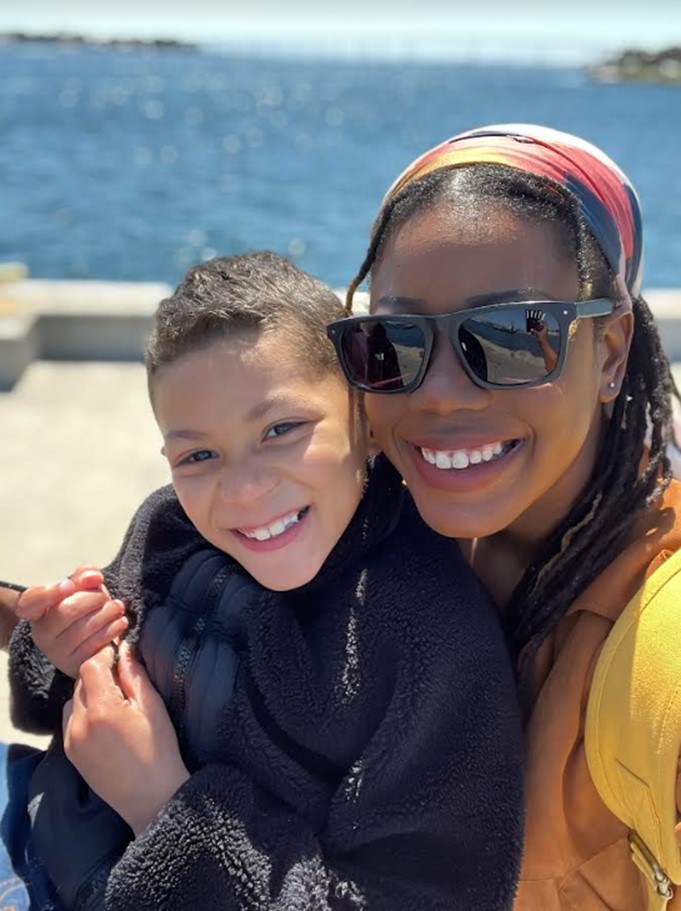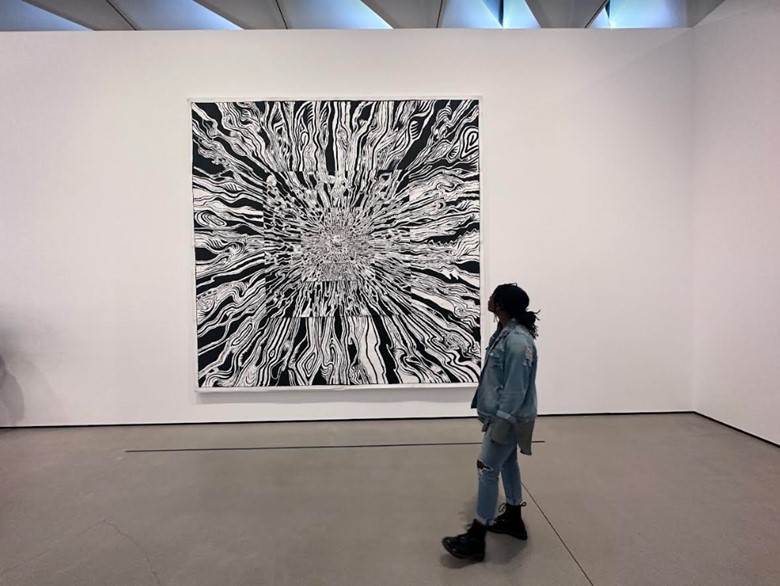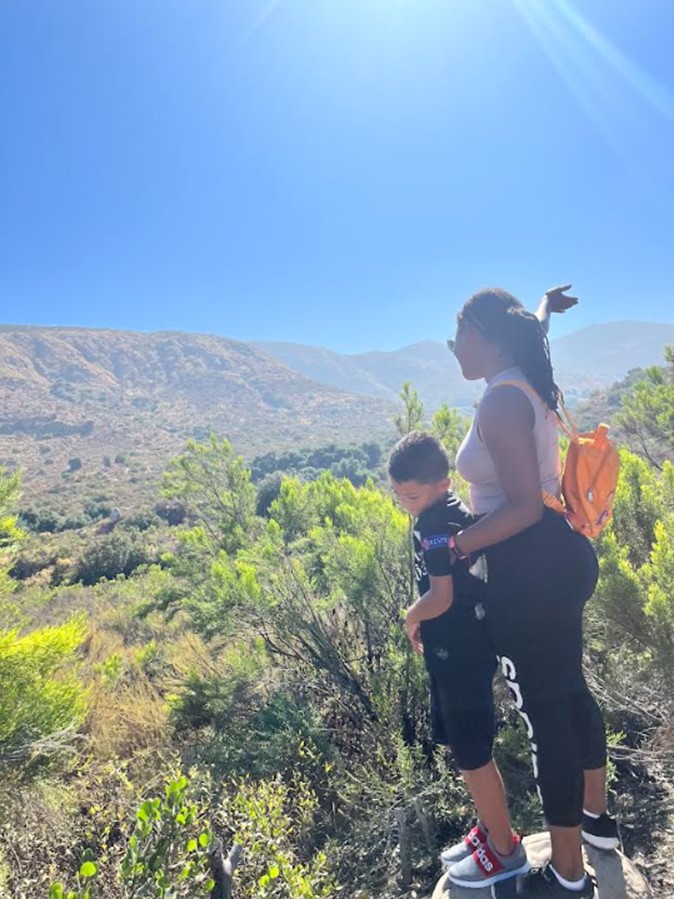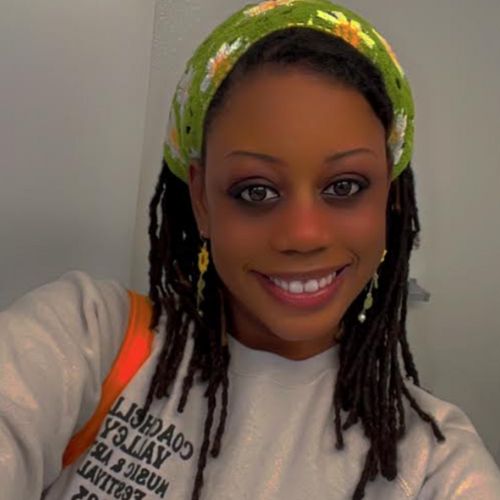Contents
Hello! Who are you?
Hi! My name is Raneisha Stassin (pronounced RUH-KNEE-SHUH) and I’m a PR consultant based in San Diego, California. Prior to San Diego, I lived in San Francisco and Belgium but I was born and raised in Arkansas.
I’m married and have an 8-year-old son on the Autism spectrum. He is my world and I spend much of my time caring for him and working with his care team. I’m also a PR consultant so I spend a great deal of time taking care of my clients, several of whom do work in the mental health and wellness space.
I’m very much an introverted homebody but when I do leave the house it’s usually to meet with other free-spirited creatives, go to see live music, a farmers market, or to a nearby beach. I really love art, music, and dance as well!
My primary form of exercise is dance and I’ve danced my entire life. It’s a great way to release negative energy in my experience. I also love to sing, write, and read. I spend a lot of time developing routines and regimens that incorporate the arts as a form of self-care and I try to engage my son in creative expression as well.
I’m also incredibly drawn to esoteric spiritual practices and spend a great deal of time in meditation, prayer, or engaged in some sort of grounding exercise. I wouldn’t say I’m happy but these practices, and my loved ones, do allow me to have a sense of gratitude that help me overcome my darker moments.

💡 By the way: Do you find it hard to be happy and in control of your life? It may not be your fault. To help you feel better, we’ve condensed the information of 100’s of articles into a 10-step mental health cheat sheet to help you be more in control. 👇
What is your struggle and when did it start?
This is a tough question for me because I’ve experienced “symptoms” much of my life but due to my upbringing, I had no awareness of it until much later in life.
I grew up in poverty in the rural South. Much of my early life was incredibly traumatic and abusive. I also experienced a lot of loss and grief from a very early age. My sister was murdered when I was a child, my grandmother who raised me as a young child passed away, and my older brother died suddenly in a car crash.
I was always quite hard on myself and had a difficult time appropriately expressing my emotions, especially after such losses, but because much of my family also struggled with similar issues I didn’t really notice a major issue until later in life.
Growing up poor in the rural south I also didn’t have access to therapists. Mental illness was also heavily stigmatized in my community. However, at 26 during my divorce, I was living in the Bay Area and had more access to this type of care.
It was during my first of 4 involuntary hospitalizations that I was initially diagnosed with Bipolar Disorder Type 1 with Psychosis, Depression, and Severe Anxiety.
I was put on a number of different medications, mostly antipsychotics and mood stabilizers, and was in and out of inpatient programs, peer support groups, and 1 on 1 talk therapy sessions before I was instead diagnosed with Borderline Personality Disorder.
I’d also been told by other clinicians that I have traits of ADHD or even Autism, however, the Borderline Personality Disorder diagnosis made sense to me given my codependency issues and the impact relationships had on my mood.
I often struggled with fits of rage, self-harm, impulsive behavior, and codependency which led to extreme anxious attachment to my partners and episodes when perceived abandonment occurred.
I still struggle with many of these things today. I often cycle through bouts of severe depression, anxiety, or splitting episodes (black or white thinking common for those with BPD).
In the past, I didn’t understand my behavior or intense mood swings, but now I understand much of it is rooted in past trauma. Nearly everything in regard to close personal relationships can trigger or set me off.
I often describe it as living life with no skin. Everything hurts and my brain interprets every single interaction as a threat or rejection.
Having greater awareness of the root causes of my triggers and why I naturally resort to feeling unsafe and defensive helps me manage it and reduces the severity of my mood swings and episodes.
How did this struggle make you feel at your worst moments?
For a long time, I did a good job of hiding the fact that I struggled with depression. This is one I’d experienced much longer than others so it felt quite familiar to me. However, after my brother passed away unexpectedly while I was in college, I became more of a recluse.
For a while, it was easy to continue to mask my symptoms because I guarded myself by spending much of my time alone and many people just came to know me as an introvert who occasionally got a little “wild”.
I used to party a lot in my younger years, which unfortunately also makes it easier to hide such symptoms, particularly symptoms of self-harm and impulsivity.
All of my romantic relationships and interpersonal relationships were typically negatively impacted nonetheless. The few people I did let close to me came to know me as someone who was extremely emotionally volatile and some might even have the impression that I was manipulative, though I feel this is an often misunderstood characteristic of those with BPD.
In reality, I was mostly just afraid. I was never able to, and frankly still struggle, with letting my guard down with anyone. Additionally, much of my behavior was reactions to very intense emotions.
Emotional regulation is something I’ve always struggled with so having deep connections and healthy relationships have always been a struggle for me, especially in the years following my brother’s death.
I often tried describing the intensity of my emotions and why I felt they warranted what appeared to be such dramatic and often frightening reactions, but it was incredibly difficult for those close to me to understand and I didn’t have a proper name for it until I received my diagnosis only a couple of years ago in 2021.
So much of my life I felt misunderstood or alone as a result. One positive of the diagnosis is that it’s easier to communicate what’s happening to those around me, though that often comes with its own stigma as well.
👉 Share your story: Help thousands of people around the world by sharing your own story. We would love to publish your interview and have a positive impact on the world together. Learn more here.
Was there a moment when you started to turn things around?
Receiving a formal diagnosis and having professionals put into words things I’ve been experiencing and give me an understanding of how my past experiences may have influenced how I process and respond to emotions definitely helped me.
I will say that while medications and traditional Western modes of healing ultimately did not work out for me, as unfortunately, BPD is still a widely misunderstood ‘disorder’ even in clinical settings, having this knowledge was the catalyst for me doing my own inner work that allowed me to better understand myself, my emotions, and my behaviors.
I will say that treatments like CBT (cognitive behavioral therapy) and DBT (dialectical behavioral therapy) were helpful in providing me with a set of skills that helped me challenge my negative thoughts and behaviors, but I ultimately felt they still didn’t help me tap into the root issue of why I was experiencing these intense emotions or reactions in the first place.
Instead, giving myself permission to explore what these emotions and thoughts were really trying to communicate to me about how I felt about myself, the world, and the people around me was most healing. I personally found that journaling, spiritual practices, grounding techniques, and connecting with others in the BPD community helped me the most.
I’ve noticed the biggest change in the past year since quitting a very demanding job and really prioritizing reducing stressors and regularly connecting with those in the mental health community for support.
What steps did you take to overcome your struggle?
By taking time to actually allow myself to safely explore my intense emotions I was able to understand that I was deeply traumatized, lacked emotional regulation skills due to my upbringing, and had severe attachment issues due to early abandonment and sudden loss.
For me, this understanding and giving myself space to feel what I feel without shame, and time to unlearn what I had unfortunately learned as a defense mechanism early in life, has helped me take steps to start shifting away from the intensity of my emotions and thoughts which in turn also helps my behavior and responses to those emotions.
Now I try to separate my identity from my thoughts and feelings and put space between those and my subsequent reactions.

In other words, when things come up for me now instead of automatically reacting in a way that feels natural for me (e.g. exploding, running away, etc.), which is often rooted in trauma, I’ve trained myself to calm my nervous system through self-care and study the root causes of these feelings and thoughts.
Unfortunately, severe Cluster B disorders are often so stigmatized that those with them don’t ever feel safe enough to truly explore their intense thoughts and emotions.
Traditional Western models typically don’t allow for those with more severely negative and harmful thoughts to have a safe space to really share them.
Oftentimes we’re perceived as a threat to ourselves and others which can stop a lot of people from really getting the support they need.
BPD (borderline personality disorder) is widely misunderstood because the episodes, impulsivity, and fits of rage can be so intense the only thing that is focused on is stopping the behaviors rather than understanding what’s causing them in the first place.
A major reason I was able to safely explore my intense emotions was that I sought out peer support groups and connected with other people in the BPD and severe mental health community who understood me and validated my need for safety, love, and support.
Peer-led support groups, self-care routines that allowed me to self-soothe, and inner work frankly have helped me more than anything else I’ve tried. It’s something I have to be super intentional about every day but I’ve seen a drastic change already.
Have you shared any of this with people around you in real life?
Due to the severity of my illness and the frequent hospitalizations I’ve had since 2019, I am very transparent about my struggles. I often had a hard time keeping up with demanding jobs, the demands of parenting, etc. when I was struggling so I had to get comfortable telling those around me that I was having a really hard time and needed help.
Oftentimes, I’d wait until I was in crisis mode when I then had no option but to get professional help. It was incredibly hard for me to learn to open up about this in professional work settings especially but I had to be transparent with my managers since I needed to focus a lot of my energy on recovery.
While I don’t necessarily recommend this to everyone, I make sure everyone who is close to me is aware since my illness is directly impacted by my interpersonal relationships and every facet of my life could potentially be impacted by that.
Typically those who are very close to me or communicate with me on a regular basis will be aware that something is wrong at some point given the nature of my illness.
I’ve found, however, that sharing my struggles has only helped me connect with others who understand and also spark important discussions that break stigma and allow others to feel safe opening up about their own struggles.
If you could give a single piece of advice to someone else that struggles, what would that be?
I wish I knew when I was younger that just because I feel awful doesn’t mean I’m an awful person. I spent much of my life hating myself because of my illnesses.
I think that people who struggle with mental illnesses, especially the more stigmatized and widely misunderstood ones, often feel shame. This can unfortunately hinder efforts to recover.
Once I learned to separate who I am as a person from my illness, specifically how it makes me think and feel, it was so much easier to really start to heal.

What have been the most influential books, podcasts, YouTube channels, or other resources for you?
Podcasts and social media pages from those who share their firsthand experience with Borderline Personality Disorder and other Cluster B disorders help me a lot!
The podcast I always recommend is Back from the Borderline because I love how Mollie approaches this topic from firsthand experience but also does a ton of research and brings on experts who can provide that behavioral science point of view.
She’s the perfect blend of empathetic and understanding, yet educational and insightful. I know that podcast has helped a ton of people in the BPD community feel less shame and more support which in my experience is the first step to really healing.
I’m also connected with Emotions Matter which is a nonprofit that is raising awareness of and support for those who live with BPD.
Where can we go to learn more about you?
I have my own podcast called “Surviving and Thriving: A Podcast About Life, Mental Health, & Personal Growth” which you can find on Apple podcasts or Spotify. I’m also fairly active on Instagram where I share mental health content as well.
💡 By the way: If you want to start feeling better and more productive, I’ve condensed the information of 100’s of our articles into a 10-step mental health cheat sheet here. 👇
This Cheat Sheet Will Help You Be Happier and More Productive
Thrive under stress and crush your goals with these 10 unique tips for your mental health.
Want more interviews?
Continue reading our inspiring case studies and learn how to overcome mental health struggles in a positive way!
Want to help others with your story? We would love to publish your interview and have a positive impact on the world together. Learn more here.



